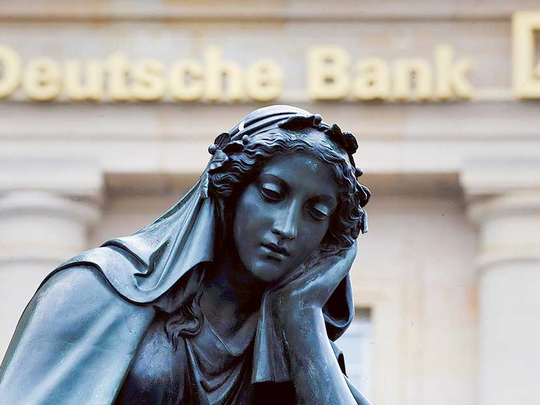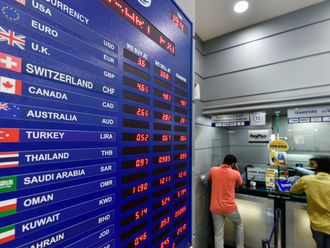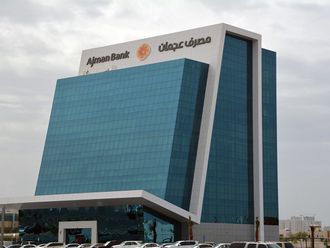
Frankfurt: Deutsche Bank AG posted a surprise profit in the first quarter as legal expenses dropped and the trading businesses performed better than analysts forecast. The shares jumped.
Net income declined to €214 million (Dh892.5 million) from €544 million in the year-earlier period, the company said in a statement on Thursday. Analysts had forecast a loss of €484.3 million, according to the average of six estimates compiled by Bloomberg. The estimates ranged from a profit of €244 million to a loss of €1.44 billion.
Co-Chief Executive Officer John Cryan, 55, under pressure to restore investor confidence in the lowest-valued major global lender, has pledged to eliminate 9,000 jobs, offload riskier assets and scrap dividends as part of a wider overhaul to restore profit growth. Germany’s largest bank wants to get “an awful lot done this year,” Cryan said on a call with analysts, adding that it’s unclear whether Deutsche Bank will return to profit in 2016.
“Deutsche Bank is one of the biggest restructuring stories in the Western hemisphere,” Filippo Alloatti, a senior credit analyst at Hermes Fund Managers Ltd., said in an interview with Bloomberg Television’s Anna Edwards. “There’s still a very long road ahead. I think we can start to see the benefits of the restructuring soon.”
Riskiest businesses
Deutsche Bank shares jumped 3.1 per cent to €17.22 at 9:08am in Frankfurt. They have dropped 26 per cent this year. At Credit Suisse Group AG, which is also shrinking its riskiest businesses, the shares have lost 31 per cent of their value in that period, while the Bloomberg Europe Banks and Financial Services Index slipped 15 per cent.
Net revenue fell to €8.1 billion from €10.4 billion a year earlier, while risk-weighted assets slipped 7 per cent to €401 billion. The cost-to-income ratio, a measure of profitability, was 89 per cent, up from 84 per cent a year earlier.
“At the moment it’s unclear to us whether we’ll make a small loss or a small profit but it’s looking as though we’re on the cusp,” Cryan said on the call. “To some extent, the lower the profits or if we have a marginal loss, it could be the hallmark of success. A bigger profit may be a hallmark of us not having achieved doing a lot of what we wanted to achieve.”
Securities business
Cryan’s overhaul has been complicated by record-low interest rates, volatile markets and plunging commodity prices eroding earnings at the securities business, led by Garth Ritchie. The global markets business reported a first-quarter pretax profit of €380 million after a loss of €16 million in the year-earlier period, while corporate and investment banking had a profit of €316 million, down from €722 million a year ago.
Deutsche Bank’s debt-trading revenue, its largest source of income, fell 29 per cent to €2.8 billion on a “challenging market environment” and as the company exited businesses such as capital-intensive securitised products. Analysts surveyed by the company forecast a drop to €1.89 billion. Equity trading revenue slipped 29 per cent to €728 million in the period.
The five largest US investment banks saw their combined trading revenue drop 22 per cent in the first quarter, with Barclays Plc on Wednesday reporting a 31 per cent drop in underlying pretax profit at the corporate and investment banking unit.
Challenging Conditions
“As you know, business conditions were challenging during the quarter, particularly in January and February, as financial market participants reacted to concerns about the outlook for the global economy — these are reflected in our results,” Cryan and co-CEO Juergen Fitschen said in a statement. “The economic and financial market outlook remains uncertain. But as you can see we are making progress on many fronts.”
Expenses fell 17 per cent to €7.2 billion from a year earlier, with litigation charges dropping to €187 million from €1.54 billion. Analysts had forecast the company’s legal charges to total €529 million in the period, according to the average of six estimates compiled by Bloomberg. Excluding legal charges and overhaul costs, the company’s operating expenses fell 2.5 per cent to €6.7 billion.
“The results look quite decent,” said Tomasz Grzelak, an analyst at MainFirst in Zurich, with a neutral recommendation on the shares. “They actually had a profit, revenues are better than expected — the only thing that’s slightly weaker is the capital.”
Deutsche Bank executives have struggled to reassure investors of the bank’s financial strength and ability to pay coupons on certain debt securities. The lender committed to payments on its riskiest debt and buying back €1.9 billion of bonds, with Cryan telling employees in February that Deutsche Bank is “rock solid.”
Capital concerns
The lender’s common equity Tier 1 ratio, a key measure of financial strength, fell to 10.7 per cent at the end of March from 11.1 per cent three months earlier.
“Concerns over the internal capital generation of the group remain,” Keefe, Bruyette & Woods analysts George Karamanos and Thomas Hallett wrote in a note to clients.
Deutsche Bank also said it faced €343 million of income-tax expenses in the first quarter, down from €920 million a year earlier. The rate was lower because of lower litigation costs. The company settled “a number of litigation cases” in the first quarter, Chief Financial Officer Marcus Schenck said on a call with analysts.
Deutsche Bank expects the “revenue environment to remain challenging in 2016,” Schenck said. While there are some signs of improvement over the past month, the company expects 2016 to be the “peak restructuring year” and is considering to accelerate cost measures, he said, adding it’s too early to give a new guidance.
“If there’s more that can get done, then more will get done,” Schenck said.
The first quarter is the first period officially reported under a new corporate structure.












